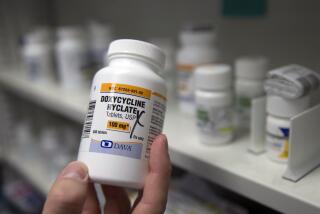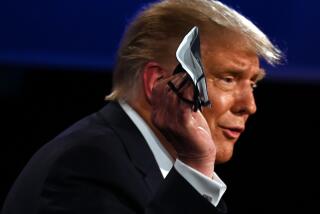Preventing HIV with drugs: What now?
- Share via
Tuesday’s announcement that a once-daily pill containing two HIV drugs could block new infections from the AIDS virus by more than 70% if people take the pill religiously has created a major stir in the AIDS-prevention world, offering the first promise that something can be done to block transmission of the virus in men. A study released in July showed that a microbicidal gel used by women could block transmission of the virus by as much as 54% when used faithfully, but the new study is the first to demonstrate a successful prevention approach in men, and it got even better results.
The approach involved pre-exposure prophylaxis, in which subjects are given an anti-HIV drug before they are exposed to the virus -- a technique that has been used for some other diseases as well. The study, conducted by Dr. Robert M. Grant of the Gladstone Institutes of Virology and Immunology at UC San Francisco and Dr. Javier R. Lama of Investigaciones Medicas en Salud in Lima, Peru, enrolled 2,499 gay men and transgender women, who were given daily doses of Truvada or a placebo for an average of 14 months.
Gay men were chosen both because they were at high risk of contracting HIV and thus could provide an effective test of the approach in a relatively short time and because controlling infections in this group was a key part of any anti-HIV strategy. Gay men account for 53% of new HIV infections in the United States and a significant percentage of infections in developing countries, according to Dr. Anthony S. Fauci, director of the National Institute of Allergy and Infectious Diseases, which provided the primary funding for the trial.
On average, those receiving Truvada had a 43.8% reduction in risk of contracting HIV, but those who took it more than 90% of the time had a 72.8% reduction in risk.
“This is the first proof that oral pre-exposure prophylaxis works in people,” Grant said, “and the first proof that any biomedical intervention can prevent HIV infection in gay and bisexual men.”
Actually taking the drug proved to be crucial. When researchers tested the levels of Truvada in the blood of the 36 patients in the treatment arm of the trial who contracted HIV, they found no drug at all in 91% of them and only barely detectable levels in the rest. “That could explain all the infections,” Grant said.
Truvada, a combination of the drugs emtricitabine and tenofovir, is manufactured by Gilead Sciences of Foster City, Calif., which provided the drug and the placebo for the trial. It is considered effective and relatively safe and is already used by more than 1.5 million people around the world. In the United States, it costs from $12,000 to $14,000 per year, but it is available in generic form in many countries for as little as 40 cents per day.
The researchers did not observe development of resistance to the drug in any of the study participants who were HIV-free at the beginning of the trial, but resistance did develop in three who were HIV-positive at the start. Experts says it is crucial that anyone planning to begin using Truvada have an HIV test to make sure they are not already infected.
Should you use it? Some doctors already have been prescribing it to selected patients that they think are at high risk, and others will probably do so now that these results have been published. But most experts think it is still too early for widespread use, particularly in any groups other than gay men. More studies are already underway to determine whether it can protect heterosexual men and women, prostitutes and intravenous drug abusers. Studies also will investigate whether other drugs will work as well.
Grant noted that his team also will study ways to increase adherence to the drug regimen in hopes of further reducing HIV risk.






